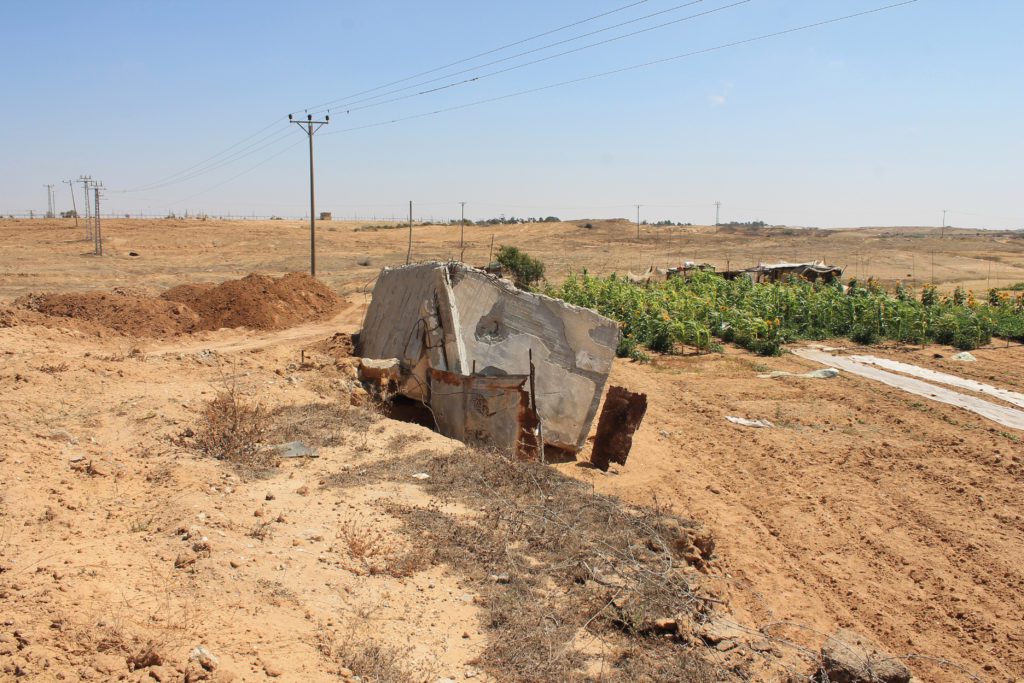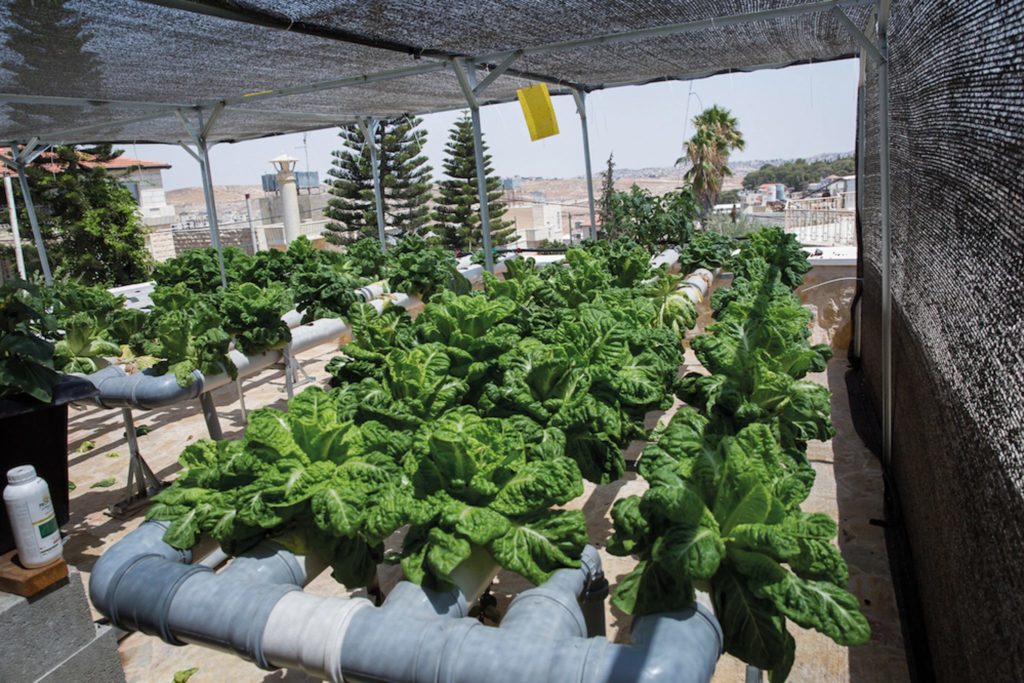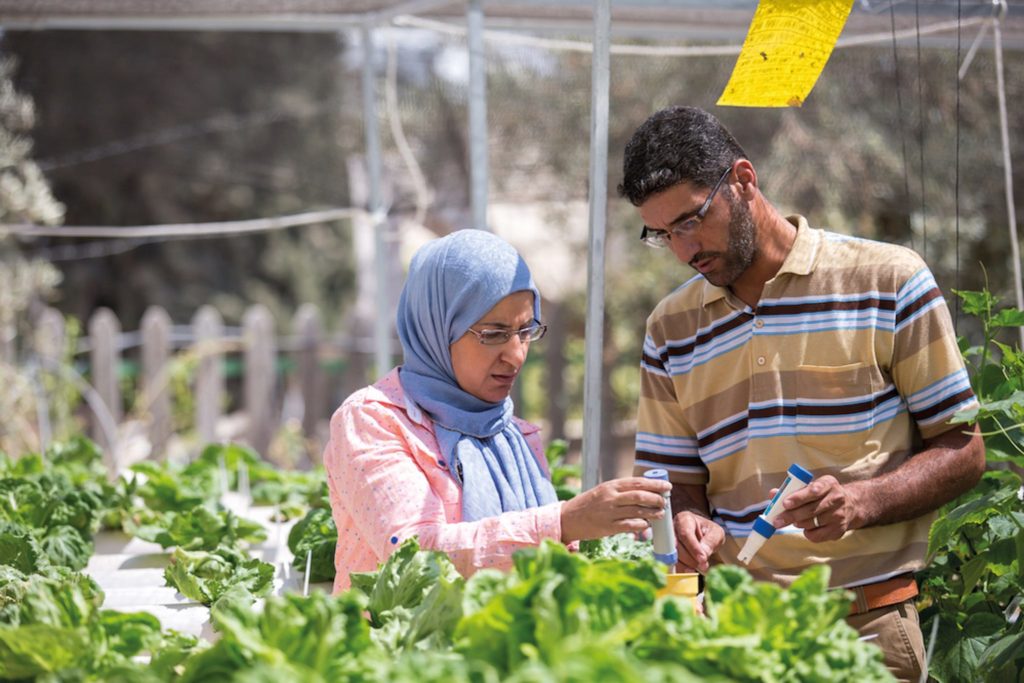Technology Solutions Empowering Agency in Food Production
Smart water management is key to sustainable, fair food production across the globe. This is only emphasized in vulnerable communities in high risk areas where access to food is restricted due to both the climate, and lack of agency. Addressing this challenge, technology developed in Palestine could provide one of the solutions.
The Intergovernmental Panel on Climate Change’s (IPCC) 2021 report is a code red for humanity. Droughts, deforestation and other climate change phenomena are expected to occur more often in many parts of the globe, threatening people’s steady access to water, food, and other essential survival materials.
This is even more prevalent in the Middle East, where the need for water preservation is of high importance. The future of sustainable and consistent water supply in the region is highly questionable, due to climate change, rising temperatures, and the persistent drought the region has been witnessing. Some countries experiencing a decrease in rainfall, such as Jordan and Iraq, resorted to pumping enormous amounts of water from the ground for irrigation with the purpose of improving their food self-sufficiency.
Food sustainability is extremely important, as the FAO estimates that food production will need to increase by 70% by 2050 in order to meet the needs of the world’s growing population that is expected to surpass 9 billion in the next 30 years. Using the most effective techniques in agriculture to secure food and preserve water are therefore essential to maximise the efficiency of our resources.
So how can this be achieved?

Palestine’s food challenge
Perhaps answers can be found in Palestine. With the fast population growth, high density of people, and economic deterioration that Palestine witnessed in the past 43 years, agricultural systems have been subject to many changes. This has posed challenges to Palestine’s ability to secure food for its population.
One of the major obstacles facing the agricultural sector in Palestine is the continuous confiscation of land by Israel. Palestinians, for example, do not have the right to work in Area C, which makes up 61% of the West Bank, according to Ma’an Development Center. Moreover, many Palestinian farmers are prevented from accessing and cultivating their lands, which lie behind the Separation Wall constructed by Israel. The wall annexed 10% of the total area of the West Bank, including its most arable lands. In addition, the Israeli army also controls 85% of Palestine’s water resources. With this situation, a different approach to traditional farming methods is needed.
Rooftop gardens
Due to a lack of space for farming, Sara, a pregnant 35-year-old lady from Al-Am’ari camp in West Bank, Palestine, uses a rooftop garden to grow her own food at home. The garden was donated through a start-up program in a collaboration between the Al-Amari Camp Program Center and Babil.bot, a start-up working with the camp to pilot new technology to better manage water resources and increase agency in food production.
Her experience with the garden has been very beneficial, as she now has consistent and sustainable access to food that is grown in her own home. The self-sufficiency provided by the garden has allowed her to be independent in a region where food insecurity affects over more than one in five people.

What helped Sara sustain her rooftop garden was Babil.bot, a scalable, automated, precision irrigation machine, created by Hamdi Hato, an environmental specialist and entrepreneur.
The innovative solution aims at decentralizing food production and creating fairer access to the most vulnerable members of society. By making the option to grow your own food accessible, home rooftop gardens will help to decentralize food production, giving the power of food back to the people. Food production practices, availability, and prices will no longer be determined by the food producers, the government, or the economy.
Decentralizing food production
Babil.bot consists both of software and hardware. It allows its users to control the lifecycle of their plants, how much water they need, and specify the right temperatures at the right timing using a dashboard.
The machine is controlled using software, its main benefit. “By using the hardware to take extensive data measurements, the software can create data maps,” explains Hamdi. “These maps can be used to show where modification is needed, where to water more, or less, and what the temperature and pH of the soil is. It will be easier to learn and analyze more with such extensive data.”
Using the data gathered allows the user of Babil.bot to make better decisions for plant placement in the future. In fact, both the hardware and software are designed to be scalable, simple, and hackable – meaning that new features can be added to the program, as well as the ability to adapt it to the user.
Initially designed to aid women in Palestinian camps to grow their food at home, this technology was essential due to the food scarcity and the water shortages many camps struggle with. This also makes this technology applicable to many different situations. Not just for farmers, the software can be used in houses or apartments in different temperatures and locations.
Enabling better decision-making
With more people growing food in smaller operations, food production will be partially decentralized and localized. This will make each community and even household more independent and resilient to crop failures and other large-scale disasters. It will give more people access to fresher food and provide greater abundance for all. In addition, it will save on shipping costs and infrastructure requirements.
Droughts, deforestation and other climate change phenomena are expected to occur more often in many parts of the globe, threatening people’s steady access to water, food, and other essential survival materials.
Self-sufficient ecosystems
The solution also aims at creating selfsufficient ecosystems for the most vulnerable. The use of Babil.bot should sustain the needs of one household, whether through increased food security should the food be consumed at home, or through income generation, if they sell their produce.
Babil.bot is a solution that uses the most efficient irrigation methods with 95- 100% water use efficiency, compared to sprinkler irrigation systems that only have 80 to 85% water use efficiency, as well as flood and furrow, which are 60 to 70% water-use efficient.

Women empowerment
Given that an estimated 40% of rural Palestinian women are carrying out unpaid work, food insecurity is even more prevalent among women in the region.
This initiative is working to alleviate this. One aspect of these attempts is placing women empowerment at it’s core. 67 women at Al Am’ari camp in West Bank were given intensive theoretical and practical training on the techniques of planting rooftops and using Babil.bot.
“The technology embedded in the machine with its great irrigation system has helped me better take care of my plants, which used to easily die before. All I need to do is set it up and it takes care of the rest, which I personally used to do before manually,” said Tasnim, one of the attendees of the training.
A sustainable future
Access to food and water is already severely limited to much of the world’s population. 1 in 3 people don’t have access to safe, clean drinking water, with 1 in 9 not getting enough food. Climate change will increase these numbers, but the problem already exists. Investment in technologies that can alleviate the strain on our water resources is essential, not only to keep our population fed and watered but also prevent the politicization of food access.
40% of Palestinians face food insecurity, compared with 10% of Americans, according the Economic Research Service. Without more innovative solutions to the growing lack of space and resources, these numbers will continue to escalate.
Decentralizing food production is key, but is also just the beginning of the process of placing fair access to food back in the hands of the many, not the few.